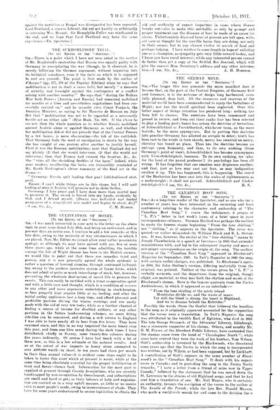TILE CULTIVATION OF HONEY.
CT° ran Emma OP THE SPECTATOR...1
SIR,-1 ells much interested in your note to the letter on the above topic in your issue dated July 28th, and being an enthusiast, and in pre-war days an active one, I venture to add a few remarks at. this late date, owing to the necessity of war circumstances in which I am placed. Now, Mr. Editor.we cannot allow your rather pessimistic apology, as although We may have agreed with you five or even three years ago, while at the came time admitting the terrible scourge the Isle of Wight diseaie has been to the British owners, we would like to point out that there ore remedies tried sod proven, and it is now generally agreed the whole epidemic in rather a question of lowered stamina, through continued in-breed- ing, owing to the modern intensive system of frame hives, which does not admit of quite ee much interchange of stock, but, however, presenting the wholesale destruction of insect life to procure the sweets. This can easily be rectified with a truer eo-operatire spirit and with a little care and thought, Which is a condition of success In any other and more expensive undertaking in stock-keeping, as bees properly kept require little or no feeding, and after the initial outlay appliances lest a long time, and afford pleasant and profitable pastime during the winter evenings and are easily made with the aid of very few tools; while as a further channel of finding a steer's, of income for disabled soldiers, or any other partisan in the future land-covering schemes, no more fitting aide-line can be conceived, and during a sick return to England I was able to turn nearly £5 in bees from five hives. They have swarmed since, and this in no way impaired the main honey crop this year, and from one hive saved during the dna+ times I have distributed, chiefly in Surrey, some twenty-live colonies during five years indirectly. Of course I have lost touch with a lot of them now, so this is a low estimate of the natural results. And as at the outset of war imports in honey alone amounted to over £100,000 worth—in short, in ten years had risen per month to their then annual value—it is evident some steps ought to be taken to foster this asset which at present is waste. while at the same time being absolutely essential for the proper fertilization of fruit and flower—thence food. Information for the most part is supplied at present through County Associations, who are severely handicapped by non-recognition by Government, and subscriptions are small and hard to get; so their labours of help and organisa- tion are carried on in a very uphill manner, as little or ao means exist to meet people's needs, owing to inconvenience of abode. They have for some years endeavoured to secure legislation to obtain the aid and authority of expert inspectors in cases where disease breaks out—also to make this notifiable, as only by prompt and proper treatment can the diseases of bees be made of no cause for alarm. Unfortunately diseased hives at present are left open, with- out care or thought for the terrible harm they are doing, not only to their owner, but to any chance visitor in search of food and perhaps lodging. I have written to some length in hopeof milistiug you as It champion, as sympathy gets very little reward to-day, and I know you have rural interest; while any interested person cannot do better than get a copy of the British Bee Journal, which will give the nearest Mut Secretary's address and any other informa-


































 Previous page
Previous page